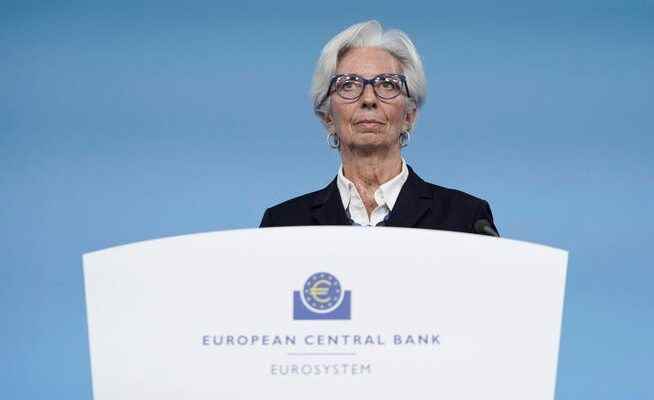Energy prices have exploded as a result of the Russian invasion of Ukraine. But inflation in Germany was already over 5 percent before that. The ECB has indulged in illusions for too long and has failed to pursue a forward-looking monetary policy.
Supposed guardian of the currency: Under ECB President Christine Lagarde, the euro has lost a lot of value against the dollar in one year.

Michael Rasch, business correspondent of the NZZ.
You are reading an excerpt from the newsletter “The Other View”, published today by Michael Rasch, business correspondent for the “Neue Zürcher Zeitung” in Frankfurt am Main. Subscribe to the newsletter for free. Not resident in Germany? Benefit here.
Record high inflation has Germany firmly in its grip. For the German readers, this most likely means that they are getting a little poorer every day. In August, the German inflation rate was just under 8 percent, According to the EU calculation method, which the European Central Bank (ECB) also uses, it is almost 9 percent. Such high inflation leads to a massive loss of purchasing power. For example, if you have 50,000 euros in a current account today, your purchasing power will drop to around 42,500 euros in just two years with an inflation rate of 8 percent – a loss of a whopping 7,500 euros. This is what “cold expropriation” feels like, which experts speak of when there is such a high loss of purchasing power.
Negative real interest rates
The scenario described is very realistic. Leading German research institutes and banks are assuming an inflation rate of 8 percent for the whole year in 2022 and expect inflation in 2023 to be between a good 7 and almost 10 percent. With 8 percent inflation, the value of money halves in just eight years – and with this value Germany is only in the middle of the euro member countries. In the Baltic States, inflation has been in the double digits for more than half a year and has now crossed the 20 percent mark. With inflation of 20 percent, 50,000 euros will shrink to 33,400 euros in two years.
Since savings deposits and bonds continue to yield only low returns (5-year and 10-year Bunds are currently trading at 1.8 and 1.9 percent), real interest rates are also currently very negative. To calculate the largely risk-free real interest rates, inflation is subtracted from the yield on ten-year German government bonds, for example. This currently results in a real interest rate of around minus 6 percent. Negative real interest rates act like a tax on savings due to the real loss of purchasing power.
In the public debate, the reason for this perfidious loss of prosperity, which is hardly noticeable, is mostly the high energy prices due to the Russian invasion of Ukraine. But that is only part of the truth. The inflation rate in Germany has been over 4 percent since last October and over 5 percent since December – twice as high as the ECB’s target for the euro zone average.
Smart monetary policy
The central bankers did not take these warning signals seriously for a long time. Instead, they claimed that the high inflation is temporary because it stems from the fallout from the pandemic and disruptions in global supply chains. Critics already doubted this thesis last autumn. The war in Ukraine, the reactions of the West to it and the exploding energy prices due to the curtailed gas supplies from Russia finally thwarted the central banks’ forecast. Inflation has been rising across the board for a long time. Food prices in Germany have been increasing at double-digit rates since May.
Central banks should act with foresight, because monetary policy always works with large lags; Experts often speak of six to twelve months. But that is exactly what the ECB and other central banks have not done. For a long time, they preferred to delude themselves with the illusion that they could easily curb inflation by raising interest rates at any time. But once high inflation has manifested itself, it is already too late for fast-acting countermeasures.
A central bank always has a certain amount of leeway when it comes to monetary policy. The ECB has used this excessively for a very generous monetary policy in recent years with its zero and negative interest rate policy and securities purchases amounting to five trillion euros. This was probably also due to the high level of debt and the financing needs of many member states. A clever monetary policy would have retained more leeway in order to be able to act more effectively in an emergency. However, that did not happen, which is why the central bankers currently do not deserve the synonym “currency guardians”. This is all the more true given that the euro has lost 17 percent of its value against the dollar in one year.
Financial Self Defense
The ECB can now regret this development, but the damage has been done – and the citizens have to pay for it. Stagnation is currently developing in Germany, i.e. a stagnating economy with high inflation rates. And for 2023, economists mostly expect a recession. How severe this will be also depends on the supply of natural gas to industry in winter.
What can we do? Financial self-defense is difficult, if not impossible, at the moment. The purchasing power of money cannot be maintained with savings and time deposit accounts or bonds, even if investors take greater risks and switch to longer maturities. Even real values such as stocks offer only limited protection, as there are usually significant price corrections in phases of economic weakness. In the 1970s, commodities performed relatively well in a fairly similar environment. If you are planning major purchases such as buying a car or a kitchen, you should make them as quickly as possible. Otherwise there is little chance of sustainably escaping cold expropriation.
SYou can the Frankfurt business editor Michael Rasch on the platforms Twitter, linkedin and Xing follow.
